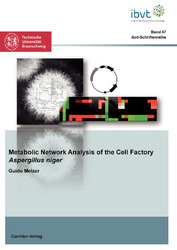| Areas | |
|---|---|
| Serie de libros (97) |
1381
|
| Nachhaltigkeit |
3
|
| Gesundheitswesen |
1
|
| Letra |
2369
|
| Ciencias Naturales |
5408
|
| Matemática | 229 |
| Informática | 319 |
| Física | 980 |
| Química | 1364 |
| Geociencias | 131 |
| Medicina humana | 243 |
| Estomatología | 10 |
| Veterinaria | 108 |
| Farmacia | 147 |
| Biología | 835 |
| Bioquímica, biología molecular, tecnología genética | 121 |
| Biofísica | 25 |
| Nutrición | 45 |
| Agricultura | 1005 |
| Silvicultura | 201 |
| Horticultura | 20 |
| Ecología y conservación de la tierra | 148 |
| Ciencias Ingeniería |
1795
|
| General |
98
|
|
Leitlinien Unfallchirurgie
5. Auflage bestellen |
|
Erweiterte Suche
Metabolic Network Analysis of the Cell Factory Aspergillus niger (Volumen 47) (Tienda española)
Guido Melzer (Autor)Previo
Indice, Datei (93 KB)
Lectura de prueba, Datei (250 KB)
In the present work, a systems biology approach is presented, which enables the prediction of potential genetic targets and optimal pathways for protein production within a metabolic network, and thus, makes an important contribution to the rational strain optimization of micro-organisms. For this, elementary flux modes analysis was carried out using a metabolic model of Aspergillus niger, which was condensed from the genome based metabolic model. Hereby, a new approach was developed for the design of cell factories by the analysis of metabolic flux correlations between metabolic enzymes. This allowed the in silico prediction of deletion and amplification targets and thus provides an important prerequisite for rational strain optimization.
The network analysis was carried out using various target products under varying nutrient conditions. The approach revealed that the success of identification of genetic targets depends on the differentiation of biological states, the growth-associated or non-growth associated production of the target proteins. Only a few targets, such as the pathways of protein glycosylation and protein biosynthesis can be identified as independent of the biological state. The growth-associated targets include inter alia the pentose-phosphate pathway (amplification target) and the reactions of the tricarboxylic acid cycle (attenuation target). The results of this systems biology approach could be validated by enzyme kinetic studies and analyses of intracellular metabolic fluxes using metabolite balancing and continuous cultivations. In addition, metabolic networks of several industrially relevant hosts were investigated using this in silico approach and essential differences were elaborated. Comparisons with experimental studies for rational strain optimization of Corynebacterium glutamicum for lysine production support the applicability of this novel in silico approach.
| ISBN-10 (Impresion) | 3869554568 |
| ISBN-13 (Impresion) | 9783869554563 |
| ISBN-13 (E-Book) | 9783736934566 |
| Idioma | Inglés |
| Numero de paginas | 180 |
| Edicion | 1 Aufl. |
| Serie | Schriftenreihe des Institutes für Bioverfahrenstechnik der Technischen Universität Braunschweig |
| Volumen | 47 |
| Lugar de publicacion | Göttingen |
| Lugar de la disertacion | TU Braunschweig |
| Fecha de publicacion | 10.09.2010 |
| Clasificacion simple | Tesis doctoral |
| Area |
Biología
|
| Palabras claves | Aspergillus niger, Flux-Design, in silico, Metabolische Netzwerkanalyse, Elementarmoden-Analyse, Amplifizierungs Target, Attenuations Target, Fluss-Korrelation, Optimale Ausbeute, Optimale Flüsse, Zellfabrik, Corynebacterium glutamicum, Lysin Produktion, Sucrase, Fructofuranosidase, Epoxidhydrolase |








